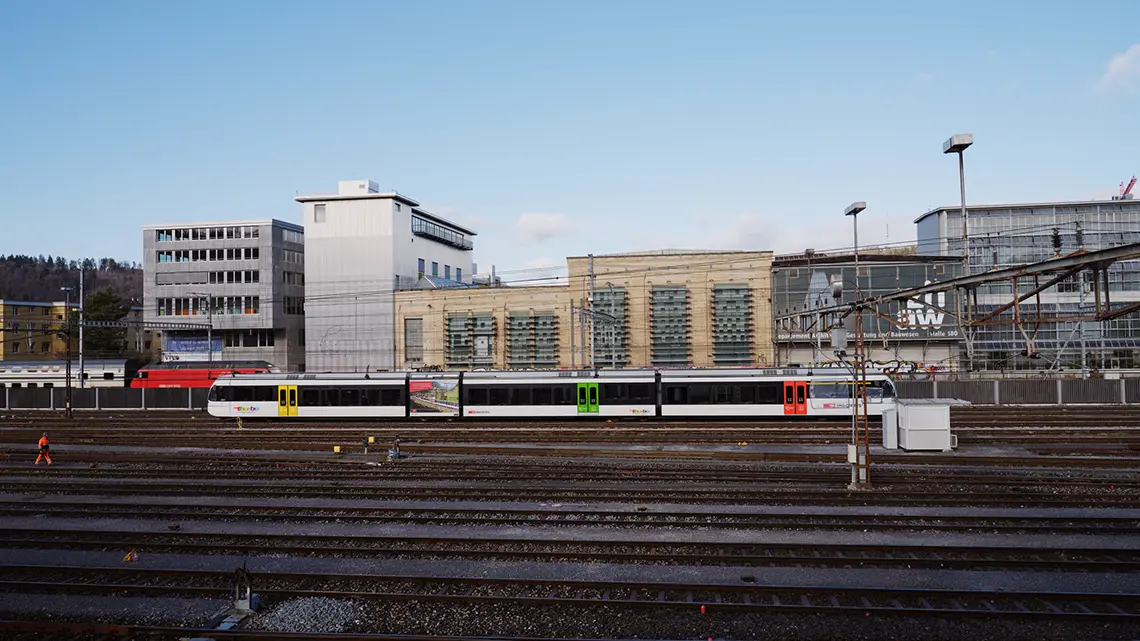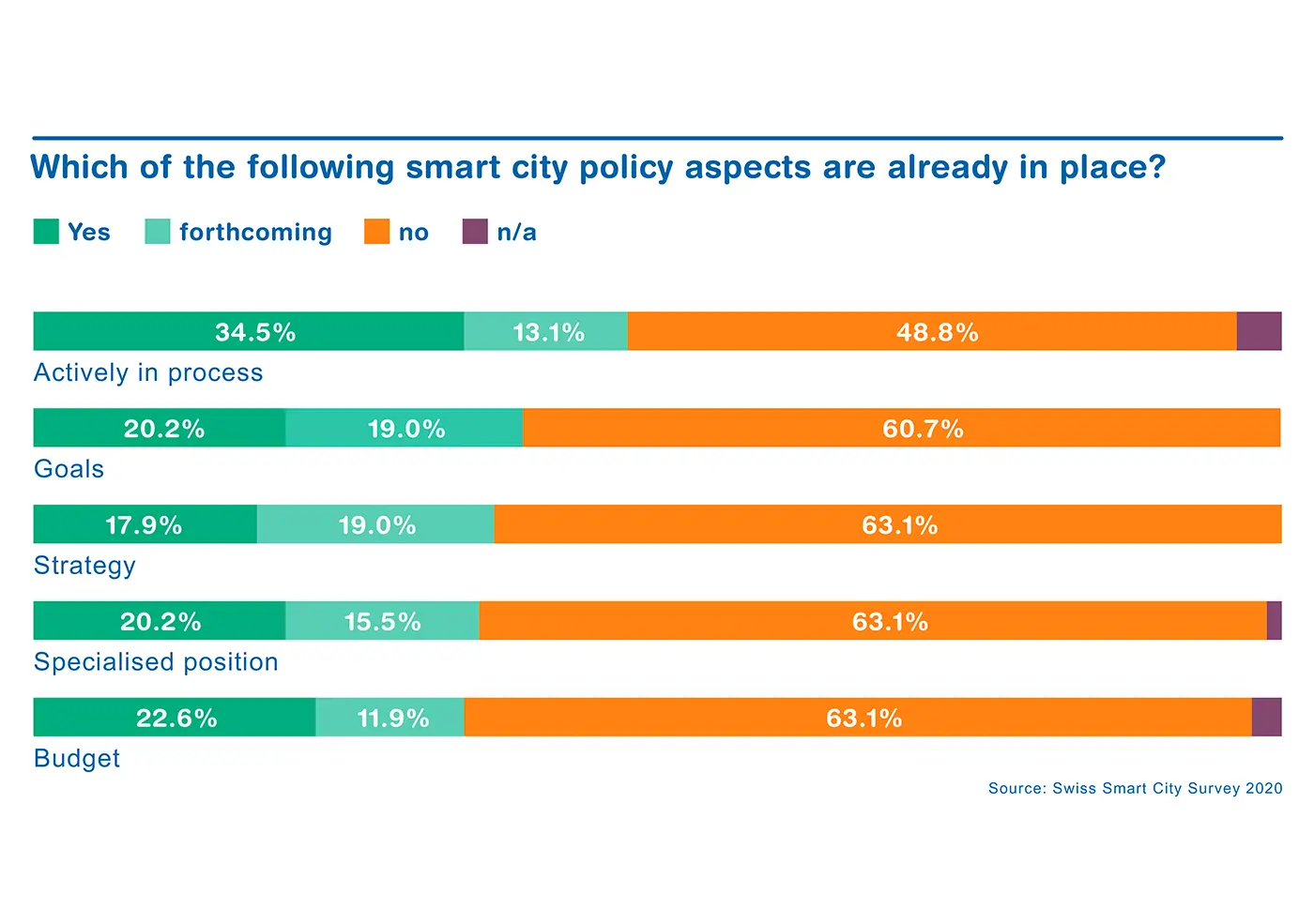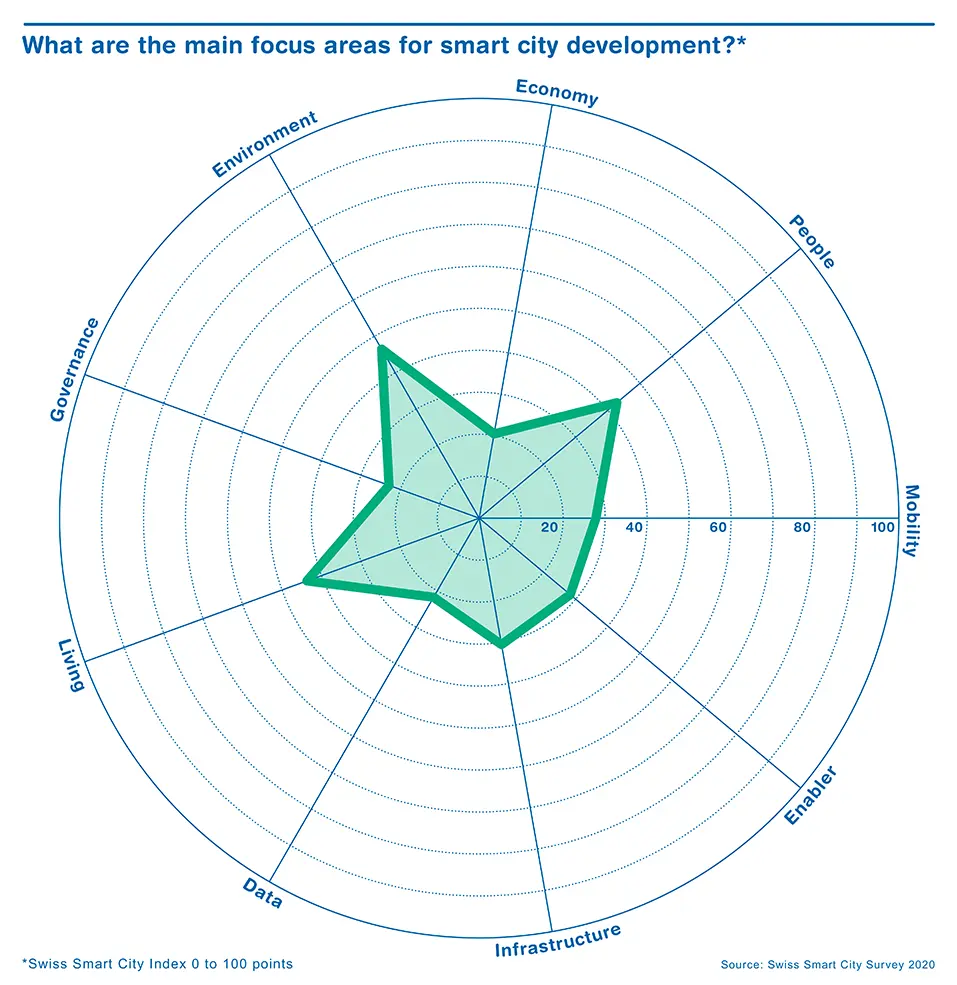Smart city activities are on the rise in Swiss cities
Smart city activities have been increasing in Switzerland since 2016. The number of cities pursuing an overarching smart city strategy is also increasing, though at a lower level. More than 40 Swiss cities are already actively engaged with the smart city concept today. This is shown in the results of the Swiss Smart City Survey, which was conducted for the first time by ZHAW together with a broad partnership.

According to the results from the first Swiss Smart City Survey, the smart city organizational structures needed within a city administration are still not well developed in Switzerland. Although more than half of the 84 participating cities rate the topic of smart cities as "important" or "very important", only 23 cities had developed a smart city strategy by the end of 2020. However, this number will increase in the coming years: 7 cities currently have a strategy under development.
Various manifestations of a smart city
What characterizes a smart city? Thanks to digitization, networking, participation and efficiency, a smart city can contribute to a higher quality of life and contribute to sustainability by reducing the consumption of resources - this is the message of the surveyed cities. In order to better illustrate the importance of different aspects of smart cities and their developments over time, an index with nine dimensions was developed for the survey. A range of concrete indicators help cities self-assess their smart city developments in the six areas of the Smart City Wheel, as well as in the additional areas of “data”, “infrastructure” and “enablers”. A total of 329 existing projects were named by participating cities in all these dimensions.
Smart governance, energy and mobility
With 98 projects, the most important area of the Smart City Wheel among the participating cities is "Smart Governance": Projects like city apps and chatbots, for example, facilitate access to information that is relevant to local administrations. There are also offerings such as “Stadtmelder” (city notifier), “eBau” (digital building permits) and “eUmzug” (e-move), which enables people to register their move without having to stop at a counter. 76 projects were assigned to the "Smart Energy and Environment" area. One frequently mentioned project is the certification as a “EnergieStadt”. Most projects that promote renewable energy do so in the area of photovoltaics, with projects like “solar community”. Other projects that have resource conservation as a goal can be found in the subareas of smart grids, smart metering, smart lighting and heating networks. "Smart Mobility" is also one of the more notable areas, with 68 projects listed. Many cities are working on a new concept for more efficient as well as decarbonized mobility systems, often focusing on intermodal transport with the expansion of existing public transport infrastructure as well as electromobility, the expansion of bicycle lanes and the integration of micro-mobility sharing.
Pioneers needed for orientation
“Smart city projects are predominantly initiated within the administration, by energy suppliers or politics, and are primarily oriented toward other cities in Switzerland and abroad, such as Winterthur or Vienna, as well as certifications such as the EnergieStadt label," says study leader Vicente Carabias-Hütter from the ZHAW Institute for Sustainable Development. Two-thirds of the cities confirm that they orient themselves by other municipalities when defining development or strategy goals. Authorities, businesses, and scientific research groups are working together on many smart city issues. They would like to see further support, especially from the federal government and the cantons. As a source of inspiration, the interactive Swiss Smart City Survey contains individual factsheets of cities that were open to sharing this information.
Swiss Smart City Survey
The Swiss Smart City Survey was developed by researchers at the ZHAW School of Engineering to capture the current state, the growing number of activities as well as needs around the topic of smart cities in Switzerland. A total of 84 out of 171 invited cities and municipalities participated in the first survey from January to April 2020. In the development and implementation of the Swiss Smart City Survey 2020, the ZHAW was supported by the following partners: SFOE EnergieSchweiz, Swisscom, Akenza, SATW, SBB, Swiss Association of Cities, Smart City Hub Switzerland, EKZ and Smart City Alliance. In order to monitor the changes in the smart city landscape in Switzerland, the survey will be conducted on a biennial basis in the future.
Kontakt
Prof. Vicente Carabias-Hütter, Institut für Nachhaltige Entwicklung, ZHAW School of Engineering, Telefon 058 934 70 15, E-Mail vicente.carabias@zhaw.ch, smartcity@zhaw.ch
Matthias Kleefoot, Public Relations, ZHAW School of Engineering,Telefon 058 934 70 85, E-Mail medien.engineering@zhaw.ch


